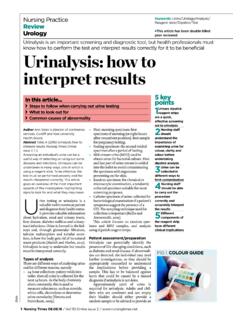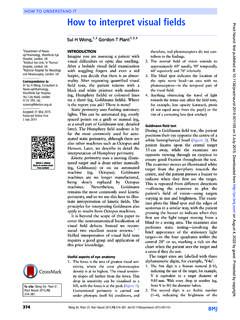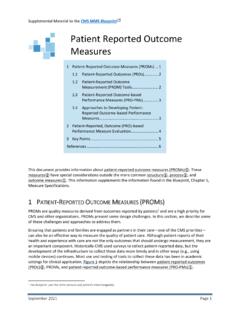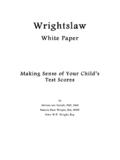Transcription of Thyroid Tests and Results - Verywell
1 Thyroid TESTSD ecoding Your Thyroid Tests and ResultsWondering about your Thyroid test Results ? Learn about each test and what low, optimal, and high Results may mean so you can work with your doctor to choose appropriate 1 Name of TestOptimal Range1 Thyroid stimulating hormone (TSH) 4 mU/L2 Free thyroxine (Free T4) ng/dL3 Free triiodothyronine (Free T3)230 619 pg/dL4 Radioactive iodine uptake (RAIU) at 6 hours3 16%Radioactive iodine uptake (RAIU) at 24 hours8 25%5 TRH stimulation test5 30 mU/L6 Thyroglobulin antibody0 4 IU/mL7 Thyroid peroxidase antibodies (TPO)0 9 IU/mL8 Thyrotropin receptor antibodies (TRAb)0 IU/mL9 Reverse T312 24 ng/dL10 Total thyroxine (T4)4 12 ug/dL11 Total triiodothyronine (T3)80 180 ng/dL12 Free thyroxin index (FTI) mcg/dL13T3 resin uptake (T3RU)25 50%14 Thyroid binding globulin (TBG) measured by electrophoresis10 24 mg/dLThyroid binding globulin (TBG)
2 Measured by -2 mg/dLLearn more at TESTST hyroid Stimulating HormoneOptimal range: 4 mU/LBorderline high range: 4 10 mU/LThyroid stimulating hormone (TSH) regulates the amount of Thyroid hormone produced by the Thyroid gland. TSH levels increase (stimulating the Thyroid gland) when Thyroid hormone levels fall, and they decrease (reducing Thyroid stimulation) when Thyroid hormone levels increase. The TSH test is probably the most important Thyroid test, often used to screen for Thyroid disease and monitor the effectiveness of treatment in a person who has Thyroid , there is ongoing controversy over the upper limit of normal for the TSH test. Most authorities, including the American Thyroid Association, use mU/L. However, in 2013, the National Academy of Clinical Biochemistry recommended that the upper limit should be reduced to mU/L. Using this lower value would greatly increase the number of people diagnosed with hypothyroidism, and most experts have rejected this ResultsOptimal ResultsHigh ResultsTSH levels that are below normal indicate hyperthyroidism.
3 If the TSH was measured as a screening test, further testing is indicated, with at least a free T4 test. Other Tests that may be helpful include free T3, Thyroid peroxidase antibody (TPO) levels, thyroglobulin antibody levels, thyrotropin receptor antibody levels (TRAb), and/or a radioactive iodine uptake (RAIU). TSH levels are also in the low range if a person with hypothyroidism is taking too much Thyroid hormone replacement medication, and may mean that a lower dose is levels in the optimal range indicate that the Thyroid gland is producing the right amount of Thyroid hormone. In a person taking Thyroid replacement therapy, normal TSH levels are often used as an indication that the right amount of medication is being levels that are higher than normal indicate hypothyroidism. If the TSH was measured as a screening test, further testing should be done with a free T4 test and possibly free T3, Thyroid peroxidase antibody (TPO), and thyroglobulin antibody levels.
4 In a person taking Thyroid replacement medication, an elevated TSH level generally indicates that a higher dosage is 2 Learn more at TESTSFree Thyroxine (Free T4)Optimal range: ng/dLThyroxine, or T4, is one of the two important Thyroid hormones. Almost all of the T4 in the blood ( ) is bound to blood proteins, but only the unbound T4 is active. The free T4 test measures the tiny amount of circulating T4 that is unbound, active advantage to measuring free T4 is that this test is not affected by changes in the Thyroid -binding blood proteins. In most people, the free T4 test can be combined with the TSH test to assess the overall status of the Thyroid ResultsOptimal ResultsHigh ResultsReduced blood levels of free T4 usually indicate hypothyroidism. When combined with an elevated TSH level, a low free T4 definitively indicates hypothyroidism. When free T4 is low, it is sometimes useful to measure Thyroid peroxidase antibody (TPO) or thyroglobulin antibody levels to confirm Hashimoto free T4 level in the optimal range usually indicates normal Thyroid gland function.
5 A free T4 level in the normal range is usually accompanied by a TSH level that is also in the normal range. When combined with an elevated TSH level, a normal free T4 may indicate subclinical hypothyroidism. When combined with a low TSH level, a normal free T4 may be an indicator of subclinical elevated free T4 test indicates hyperthyroidism and is virtually always accompanied by a low TSH level. Measuring Thyroid peroxidase antibody (TPO) or thyroglobulin antibody levels may help to confirm Graves' disease. If Graves' disease is suspected, it is often helpful to measure thyrotropin receptor antibodies (TRAb) as Triiodothyronine (Free T3)Optimal range: 230 619 ng/dLTriiodothyronine, or T3, is one of the two important Thyroid hormones. Most of the T3 in the blood ( percent) is bound to blood proteins, but only the unbound T3 is active. The free T3 test measures the tiny amount of circulating T3 that is unbound, active T3.
6 In contrast to the measurement of total T3, the advantage to measuring free T3 is that this test is not affected by changes in the Thyroid -binding blood free T3 is usually unnecessary in assessing a person's Thyroid status, as long as TSH and free T4 levels are measured. Rarely, however, some people withhyperthyroidismwill have high T3 levels but normal T4 levels. So, measuring free T3 is most useful when the TSH levels are low (suggesting hyperthyroidism) but T4 levels are ResultsOptimal ResultsHigh ResultsReduced free T3 levels are virtually always accompanied by reduced free T4 levels and high TSH levels and indicate hypothyroidism. It is sometimes useful to measure Thyroid peroxidase antibody (TPO) or thyroglobulin antibody levels to confirm Hashimoto T3 levels in the normal range indicate normal Thyroid function and is usually accompanied by normal free T4 and normal TSH levels.
7 A normal free T3 level with a low TSH level might indicate subclinical hypothyroidism. A normal free T3 level with an elevated TSH level might indicate subclinical elevated free T3 test indicates hyperthyroidism and is virtually always accompanied by elevated free T4 and low TSH levels. Measuring Thyroid peroxidase antibody (TPO) or thyroglobulin antibody levels may help to confirm Graves' disease. If Graves' disease is suspected, it is often helpful to measure Thyrotropin receptor antibodies (TRAb) as 3 Learn more at Stimulation TestOptimal range: 5 30 mU/LIn some rare cases, hypothyroidism is caused by disease of the pituitary gland or the hypothalamus instead of disease of the Thyroid gland itself. When this happens, TSH levels are low despite the presence of hypothyroidism. To test whether the pituitary is able to release TSH normally, the TRH stimulation test may be , thyrotropin-releasing hormone (TRH) is secreted by the hypothalamus in response to reduced Thyroid hormone levels and its job is to further stimulate the pituitary gland to release TSH.
8 With the TRH stimulation test, an intravenous dose of TRH is administered, and subsequent TSH levels are , for a normal response, TSH levels should rise substantially within 20 minutes to 5-30 mU/L and drop again within 60 minutes after TRH administration. However, the normal response to TRH administration is highly variable, often making this test difficult to ResultsOptimal ResultsHigh ResultsIf TSH levels do not increase as expected, pituitary disease (or sometimes, hypothalamic disease) should be strongly suspected as a likely cause of hypothyroidism. Generally, an MRI scan of the hypothalamus/pituitary region of the brain should be the next normal or high increase in TSH levels is an indication that the pituitary gland is able to release TSH normally, and that pituitary disease is not the cause of TESTSR adioactive Iodine Uptake (RAIU) at 6 or 24 hoursOptimal range at 6 hours:3 16%Optimal range at 24 hours:8 25%The radioactive iodine uptake (RAIU) test measures the uptake of iodine by the Thyroid gland, which can help to determine the cause of hyperthyroidism.
9 In this test, a small dose of radioactive iodine is given by mouth, and later (usually after 24 hours) the gland is scanned to estimate how much of the iodine has been taken up by the Thyroid . Low ResultsOptimal ResultsHigh ResultsA reduced or optimal iodine uptake in a person with hyperthyroidism often indicates subacute thyroiditis. In subacute thyroiditis, elevated blood levels of Thyroid hormone often result from inflammatory destruction of the Thyroid gland, and the subsequent release of T4 and T3 into the circulation, rather than from the overproduction of Thyroid low or optimal uptake in a person with hyperthyroidism can also mean that the subject is surreptitiously or unknowingly ingesting Thyroid hormone; or it can indicate strumaovarii, a condition in which Thyroid hormone is produced in the pelvis rather than the a person with hyperthyroidism, a high iodine uptake is the most common result and indicates that the Thyroid gland is working overtime to produce too much Thyroid hormone.
10 Most typically, this is seen with Grave's 4 Learn more at TESTST hyroglobulin AntibodyOptimal range: 0 4 IU/mLBoth Graves' disease (which typically produces hyperthyroidism) and Hashimoto disease (which typically produces hypothyroidism) are autoimmune diseases. One of the manifestations of these autoimmune Thyroid conditions is that they often produce antibodies to thyroglobulin, the major Thyroid -binding protein within the Thyroid gland. The presence of thyroglobulin antibodies is consistent with autoimmune Thyroid disease and can be helpful in confirming the ResultsHigh ResultsOnly about 50% of people with Hashimoto disease and about 25% of people with Graves' disease will have detectable thyroglobulin antibodies, so an optimal level (below 4 IU/mL) is not helpful in making a diagnosis of autoimmune Thyroid disease. Levels of thyroglobulin antibodies above the threshold are consistent with Hashimoto or Graves' disease and can be helpful in confirming the diagnosis.








